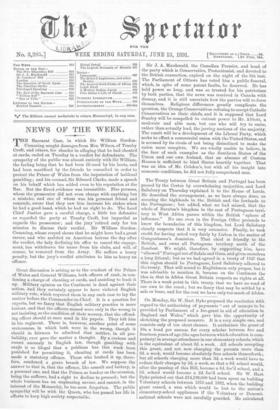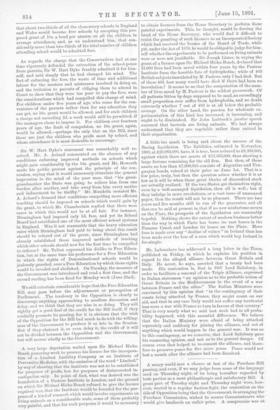On Monday, Sir W. Hart Dyke proposed the resolution with
regard to the authorising of payments "out of moneys to be provided by Parliament of ,a fee-grant in aid of education in England and Wales," which gave him the opportunity of sketching the proposed measure. It is a very simple one, and consists only of ten short clauses. It authorises the grant of 10s. a head per annum for every scholar between five and fourteen years of age (the ages between which education is com- pulsory) in average attendance in our elementary schools, which is the equivalent of about 3d. a week. All schools accepting this grant, and not now charging the parents more than 3d. a week, would become absolutely free schools thenceforth ; but all schools charging more than 3d. a week would have to reduce their charges by 3d. a week, so that a 9d. school would, after the passing of this Bill, become a 6d. fee'd school, and. a 5d. school would become a 2d. fee'd school. Sir W. Hart Dyke pointed out that 214,136,000 had been spent on building Voluntary schools between 1870 and 1882, when the building grant ceased, a sum which would be lost to the nation's elementary-school appliances if the Voluntary or Denomi- national schools were not carefully guarded. He calculated that about two-thirds of all the elementary schools in England and Wales would become free schools by accepting this pro- posed grant of 10s. a head per annum on all the children in average attendance, and, as we understand him, that con- siderably more than two-thirds of the total number of children attending school would be admitted free.



































